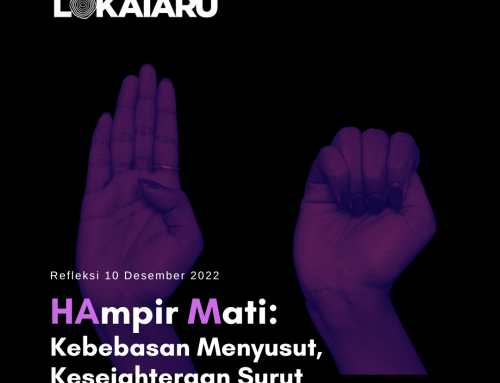by. Nurkholis Hidayat
Today, we see more enthusiasm for tax reform in Indonesia. Although opposed by some civil society groups, President Joko “Jokowi” Widodo’s administration continues to push its fiscal framework reform — which includes a tax amnesty and more incentives for taxpayers.
Last year, the Finance Ministry issued a new tax holiday regulation, expanding the scope and duration of tax holidays for eligible companies.
More recently, a minister suggested Indonesia set up a tax haven on one of its islands. Further, there is also plan to cut corporate tax from 25 to 17 percent.
The goal of these policies is clear, to compete with other tax jurisdictions and create a larger base of taxpayers for state revenue.
The government expects to bring back home and make taxpayers more comfortable in putting their money in Indonesia.
But, the critical question is whether the government’s tax reform policies are in line with the global human rights agenda on establishing fair and just taxation to maximize the state’s capacity to reduce poverty and to fulfill human rights, especially economic, social and cultural rights.
Using a perspective of human rights to form taxation policy may be debatable.
But, fortunately, the link between taxation and human rights is now well understood. Research from ActionAid, Oxfam, the Tax Justice Network and IBA show that at least two-related issues between taxation and human rights: a direct impact from operational company activities to human rights violations and an indirect impact of public revenue losses resulting in loss of state capacity to mobilize maximum resources to realize human rights, particularly economic, social and cultural rights.
Recently, the UN Committee of Experts on International Cooperation in Tax Matters suggests that although there is no violation of specific laws, it is now well understood that the practice to exploit the weaknesses of domestic and international law to avoid tax payments are considered improper and abusive.
It is a new development. Previously, companies freely used various examples of aggressive tax planning strategies to avoid paying tax, such as loopholes, tax havens, subsidies, anonymous trust accounts, mailbox companies, fake foundations, trade mispricing, transfer-pricing, and other techniques of tax avoidance.
Against this background, it is questionable whether the Jokowi administration’s tax reform agenda also includes a package to curb tax avoidance practices.
To be honest, I doubt it. To make it clear, it would be necessary to understand how tax avoidance strategies operate and how Jokowi’s tax reform policy will fail to address such methods.
Many developing countries, including Indonesia, surrendered to the demand and pressure of multinational corporations to set up a fiscal framework and specific contractual arrangements with low taxes.
That is the first step of the tax avoidance strategy. It includes long tax holidays, fully written-off capital costs, exemptions from import and export duties and more incentives.
More examples include specific transfer pricing arrangements, capitalization through debt with financial institutions affiliated with the same company and located in a low-tax jurisdiction, minimal royalties at 3.5 percent, which is now generally accepted as a common standard in the mining sector, and low corporate profit taxes at around 15 to 20 percent.
In fact, such advantageous fiscal terms are often the result of corruption, with various methods of payments or grants by corporations to public officials to secure more favorable terms.
Such corruption can occur in two directions: either by an initiative of investors who seek higher returns and collude with corrupt elites willing to accept direct bribes and similar benefits such as lucrative service contracts, or by very attractive investment conditions offered by political elites in the hope of generating large initial payments, such as signature bonuses, which can be embezzled or used to address short-term elite
interests.
Many companies also aggressively design companies’ business structure by seeking all potential tax advantages. The most common method for this purpose is to inflate expenditures and thus reduce taxable rates through over or under-invoicing.
It is typically done through transfer mispricing or sale of companies’ products against nonconforming market prices. This advantageously sets prices for internal transactions between two or more subsidiaries of the same corporation group or through its mailbox companies.
When the global effort is becoming more focused on how to build international cooperation to curb various methods of aggressive tax planning strategies on tax avoidance, Indonesia, in contrast, is going in the opposite direction by providing tax amnesty and more fruitful packages and incentives for tax evaders and avoiders.
Following the leak of the Panama Papers, many developed countries, which also suffer from the various methods of tax avoidance, struggle to cover loopholes and weaknesses of their domestic fiscal policies that are always exploited by tax advisors and lawyers to avoid taxes without breaching any law and regulation.
International cooperation against illicit financial flows, money laundering, transfer pricing and other methods of tax avoidance is being generated.
The era of unfair global tax competition — by providing low taxation and havens — seems to be ending.
By contrast, as previously mentioned, Indonesia is offering amnesty and more incentives, holidays and exemptions for tax payers.
Unlike other countries that have launched stricter fiscal framework, what Indonesia provides is too soft for the evaders and avoiders.
Similarly, in her article in The Huffington Post, on April 14, Sri Mulyani, as World Bank managing director at the time, underscored the need to create a more fair taxation system.
It will now be interesting to see how her agenda will be incorporated with Jokowi’s ambition to reform tax as both their visions seem to contradict each other.
Early impact of her touch may be seen in Jokowi’s speech in front of the House of Representatives. We heard from Jokowi, for the first time, that stronger law enforcement in taxation will follow the tax amnesty program.
Tax amnesty is a pragmatic taxation policy with short-term interests. In a country with a high crony-capitalism index, this policy creates more damage than benefits to the tax system.
If we see the profiles of Indonesian elites and politicians who avoid tax as revealed in the Panama Papers, then we see that the original intent of this policy is more political than economic. If we compare the amount of state revenue losses due to tax avoidance practices and the amount of money returned home or repatriated by such a policy, we would find a sense of unfairness.
Similarly, we see more revenue losses than gains from foreign investment, let’s say, as a result of lower taxation, a longer period of tax holidays, lower income or corporate tax and other tax exemptions.
Indonesia’s tax reform policy should be in line with the international effort to curb tax abuse and tax evasion practices.
Under international human right customary laws, especially the UN Guiding Principles on Business and Human Rights (UNGPs), business entities should respect human rights, and the state should protect its people from the negative impacts of business interests.
I believe that Indonesia’s tax reform package should also be in line with those principles.
This article firstly published at http://www.thejakartapost.com/academia/2016/08/30/tax-reform-as-new-human-rights-agenda.html







